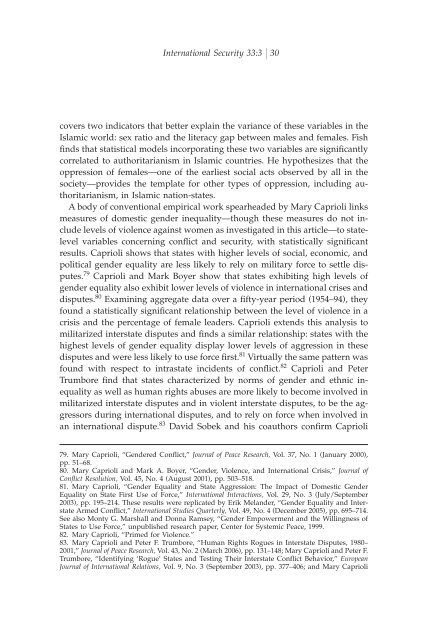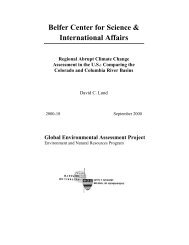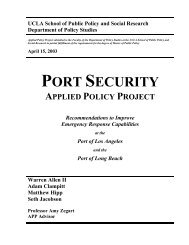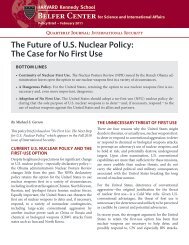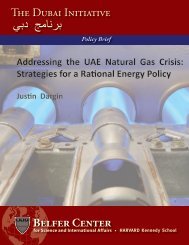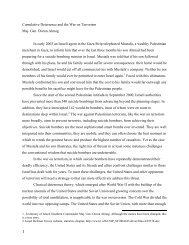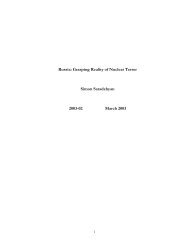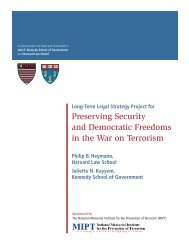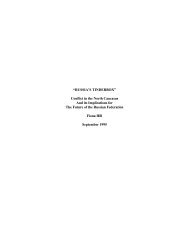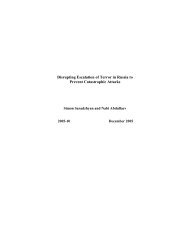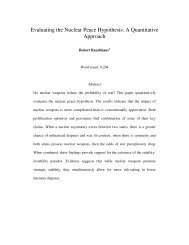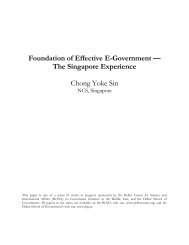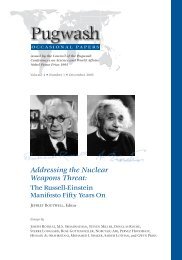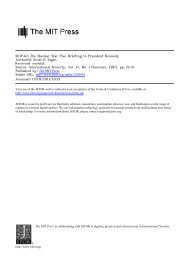The Heart of the Matter Valerie M. Hudson, - MIT Press Journals
The Heart of the Matter Valerie M. Hudson, - MIT Press Journals
The Heart of the Matter Valerie M. Hudson, - MIT Press Journals
You also want an ePaper? Increase the reach of your titles
YUMPU automatically turns print PDFs into web optimized ePapers that Google loves.
International Security 33:3 30<br />
covers two indicators that better explain <strong>the</strong> variance <strong>of</strong> <strong>the</strong>se variables in <strong>the</strong><br />
Islamic world: sex ratio and <strong>the</strong> literacy gap between males and females. Fish<br />
ªnds that statistical models incorporating <strong>the</strong>se two variables are signiªcantly<br />
correlated to authoritarianism in Islamic countries. He hypo<strong>the</strong>sizes that <strong>the</strong><br />
oppression <strong>of</strong> females—one <strong>of</strong> <strong>the</strong> earliest social acts observed by all in <strong>the</strong><br />
society—provides <strong>the</strong> template for o<strong>the</strong>r types <strong>of</strong> oppression, including authoritarianism,<br />
in Islamic nation-states.<br />
A body <strong>of</strong> conventional empirical work spearheaded by Mary Caprioli links<br />
measures <strong>of</strong> domestic gender inequality—though <strong>the</strong>se measures do not include<br />
levels <strong>of</strong> violence against women as investigated in this article—to statelevel<br />
variables concerning conºict and security, with statistically signiªcant<br />
results. Caprioli shows that states with higher levels <strong>of</strong> social, economic, and<br />
political gender equality are less likely to rely on military force to settle disputes.<br />
79 Caprioli and Mark Boyer show that states exhibiting high levels <strong>of</strong><br />
gender equality also exhibit lower levels <strong>of</strong> violence in international crises and<br />
disputes. 80 Examining aggregate data over a ªfty-year period (1954–94), <strong>the</strong>y<br />
found a statistically signiªcant relationship between <strong>the</strong> level <strong>of</strong> violence in a<br />
crisis and <strong>the</strong> percentage <strong>of</strong> female leaders. Caprioli extends this analysis to<br />
militarized interstate disputes and ªnds a similar relationship: states with <strong>the</strong><br />
highest levels <strong>of</strong> gender equality display lower levels <strong>of</strong> aggression in <strong>the</strong>se<br />
disputes and were less likely to use force ªrst. 81 Virtually <strong>the</strong> same pattern was<br />
found with respect to intrastate incidents <strong>of</strong> conºict. 82 Caprioli and Peter<br />
Trumbore ªnd that states characterized by norms <strong>of</strong> gender and ethnic inequality<br />
as well as human rights abuses are more likely to become involved in<br />
militarized interstate disputes and in violent interstate disputes, to be <strong>the</strong> aggressors<br />
during international disputes, and to rely on force when involved in<br />
an international dispute. 83 David Sobek and his coauthors conªrm Caprioli<br />
79. Mary Caprioli, “Gendered Conºict,” Journal <strong>of</strong> Peace Research, Vol. 37, No. 1 (January 2000),<br />
pp. 51–68.<br />
80. Mary Caprioli and Mark A. Boyer, “Gender, Violence, and International Crisis,” Journal <strong>of</strong><br />
Conºict Resolution, Vol. 45, No. 4 (August 2001), pp. 503–518.<br />
81. Mary Caprioli, “Gender Equality and State Aggression: <strong>The</strong> Impact <strong>of</strong> Domestic Gender<br />
Equality on State First Use <strong>of</strong> Force,” International Interactions, Vol. 29, No. 3 (July/September<br />
2003), pp. 195–214. <strong>The</strong>se results were replicated by Erik Melander, “Gender Equality and Interstate<br />
Armed Conºict,” International Studies Quarterly, Vol. 49, No. 4 (December 2005), pp. 695–714.<br />
See also Monty G. Marshall and Donna Ramsey, “Gender Empowerment and <strong>the</strong> Willingness <strong>of</strong><br />
States to Use Force,” unpublished research paper, Center for Systemic Peace, 1999.<br />
82. Mary Caprioli, “Primed for Violence.”<br />
83. Mary Caprioli and Peter F. Trumbore, “Human Rights Rogues in Interstate Disputes, 1980–<br />
2001,” Journal <strong>of</strong> Peace Research, Vol. 43, No. 2 (March 2006), pp. 131–148; Mary Caprioli and Peter F.<br />
Trumbore, “Identifying ‘Rogue’ States and Testing <strong>The</strong>ir Interstate Conºict Behavior,” European<br />
Journal <strong>of</strong> International Relations, Vol. 9, No. 3 (September 2003), pp. 377–406; and Mary Caprioli


